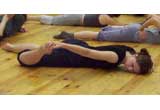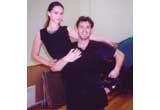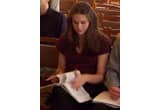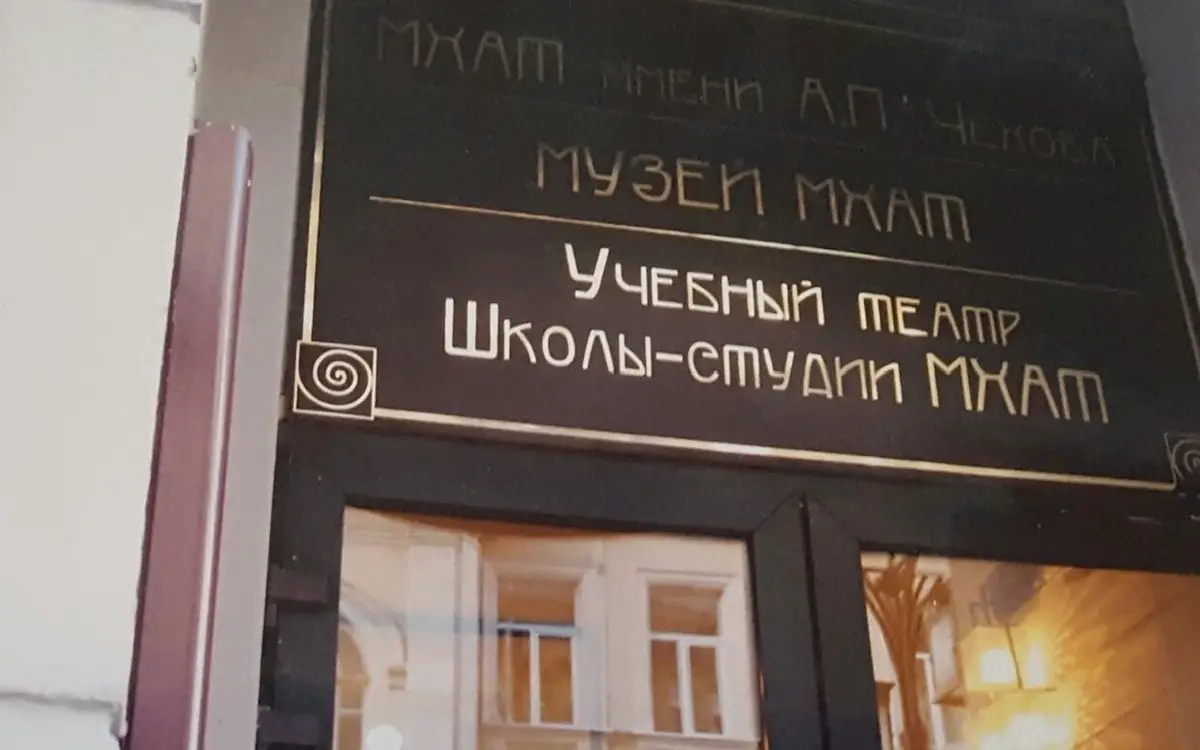
Amanda Rae Jones is a graduate of the “American Studio” acting program offered through the Moscow Art Theater (MXAT). The program remains prestigious even after almost a century of existence. The Theater itself was home to Konstantin Stanislavski, whose theories of acting, the first in their time to fully integrate psychology and social sciences into a general method of presentation, still remain the basis of the vast majority of acting programs. Most Hollywood stars have been trained in his “Method.”
Amanda shared with us her experience of learning the technique in its motherland and of pushing herself and her art farther than she or it had ever gone before.
SRAS: How did you find out about the MXAT program and what about it piqued your interest?
Amanda: I first heard about the MXAT program when I received the offer for graduate school at Wayne State University. Wayne State has a program that sends its students overseas to study with professional Russian actors, dancers, movement coaches, and singers. The opportunity to learn in the heart of the Stanislavski System and Mikhail Chekhov Technique was an experience so unique that I couldn’t pass it up. I felt it would truly round out my theatrical education, not to mention that seeing the sights of Russia proved to be a definite plus!

SRAS: For those who are not Theater majors, can you give us some idea of who Mikhail Chekhov and Konstantin Stanislavski were and what systems they created?
Amanda: The systems are difficult to describe because they really are theories that were works in progress. Stanislavski himself was just starting to change and rethink his system when he died. The bulk of his work was done through trial and error, and in fact, he never really intended to develop a “system.” In a very brief nutshell, Stanislavski wanted to bring more humanity and truth into acting and aimed to develop techniques that would do that. Some important principles are training the body to relax and become extremely focused, developing the imagination and ability to memorize and recall sensory details of past emotions, and to develop an acute sense of “if” on stage, i.e. acting “as if” one were the character. A role is broken into events where an actor plays objectives in a scene, asking: What do I want, and what am I doing to the other character to get what I want.
Mikhail Chekhov was also very focused on the imagination and what it could do for the actor. Atmosphere, movement, concentration and intense ensemble work are all valuable tools within the technique to help open creativity within the individual. He believed that characters came alive in improvisation, dreams or fantasies and not in the intellectual mind. He developed a series of physical actions that an actor can employ, explore, and then discard at the last moment in order to color a specific beat in a scene. His aim was to create a method that actors could draw on at any time to help inform a moment, a line, a character, an atmosphere, or the essence of a play.
Because I believe that there are multiple ways to approach and create a character, I have found both of these techniques extremely valuable in my work.
SRAS: And you, of course, are not alone. Nearly every professionally trained American actor since James Dean and Marilyn Monroe have found those techniques indispensable. But why go to Russia to learn them?

Amanda: In my opinion, acting classes in the States seem to be more about creating a safe environment for the actor where one may fully let go of societal restraints in order to achieve optimum creativity. American classes are more freeform and spontaneous. Russian classes are much more regimented. The body is the only instrument one has and it needs to be tuned: physically fit and agile and ready to go at any time. The mind is equally important. Training of the mind is emphasized so that it becomes able to operate on multiple different wavelengths at the same time, the kind of concentration necessary for work on the stage. Emphasis is also strongly placed on ensemble and we would often participate in exercises that would require the group to work as a whole; if someone messed up, or broke a rhythm, extreme pressure was put upon that person, which could get a little intense. However, Theater is not about the individual and thrives when everyone is working together. There is also a marked respect for the instructor, an almost reverence; something that can be challenged at times in the States.
SRAS: It sounds like the program was pretty intense and that you learned a lot. What kind of curriculum did the program use?
Amanda: On Mondays and Wednesdays I had Ballet and Acting. On Tuesdays was Movement class, Mikhail Chekhov Technique, and Acting. Thursdays–Movement, Singing, and Acting. Fridays–Theater History, Mikhail Chekhov, and Acting. Saturday–Movement, Singing, and Acting. Evenings and Sundays were spent working on homework, and seeing theatrical performances at local Moscow Theaters.
SRAS: Tell us more about the Theaters you saw.
Amanda: We were able to see plenty of Theater, averaging roughly four or five performances a week. We even fit in an opera and the Bolshoi Ballet. I think my three favorite productions were King Lear, Romeo and Juliet, and The Seagull. Perhaps, it was due to the fact that the plot lines were more familiar to me that I could worry less about what was happening in the story and more about the acting. I remember being so impressed with actors that created an ensemble, and truly used their bodies to their full potential in everyway possible. Their economy and ease in which they moved, as well as their concentration and emotional connection with their fellow actors was incredible to witness. Just being able to see what we were learning in class being executed with ease on stage was inspiring.
Beyond that, our schedule was quite booked so that unless you specifically made time for it, seeing the city was a bit of a challenge, but we were able to see the most notable sites (the Kremlin, Lenin’s tomb, Stanislavski’s house and gravesite, etc.) and were able to get in some American tourist shopping– a definite must!
SRAS: So even as a foreigner who doesn’t speak Russian, you got around all right. Did it take you long to acclimate to your new environment in Russia?

Amanda: My initial reaction was a bit blurred as we had flown for what seemed like forever and I was suffering some serious jet lag and a bit of culture shock. When we got off the airplane, our translator was there waiting to see us into Moscow and to show us to our dorms. Wayne State was able to have one floor of a dormitory that is specifically set up for American students. We were able to either have our own room, or share with one other person. Although, my room was especially small, it offered all the privacy to rehearse monologues, scenes, dances, and songs that I needed. We had many of the luxuries we were used to in the States– except hot water after the first two showers of the day. We were able to quickly drop off our luggage and then we were taken to the MXAT school. We had lunch in the cafeteria, and a brief orientation, and then we were up early the next day to start our busy schedule. I remember worrying if I would get lost in Moscow, what would happen if I got off on the wrong metro stop, worrying about the Russian instructors talking so much louder than the translators, worrying if I’d have to eat borsch the entire time I was there, and wondering why in the world no one smiled. But soon we were so busy that all of those worries quickly disappeared.
SRAS: They disappeared because you got used to things, and they weren’t concerning anymore?
Amanda: Yeah, I found myself in this weird emotional state when I first arrived in Russia, things were so different, exciting, and busy; I couldn’t read any of the street signs–except McDonalds, and we were all so exhausted. That’s kind of a bizarre little acclimating period. But when I was able to adjust to the Moscow time change, adapt, and relax, things really started to take off. I found the instructors so engaging and focused. They were so open and warm and encouraged us to stretch ourselves and our imaginations. I also learned a lot about myself. I learned how far I could push myself, both physically in movement classes, and emotionally in scene work as well. I admit I can be a pretty intense person, so once I relaxed and started to have fun and find joy in working hard, feeling like I was in boot camp turned out to be fantastic.
SRAS: What are your long-term plans? How do your adventures in Russia fit into those?
Amanda: I graduate in May ‘05 from Wayne State after working for three years with the Hilberry Repertory Theater. I plan on working regionally for a while as a professional actor. I have been able to incorporate the training I received at MXAT and I feel that I now have been able to add greater number of skills to my own process. My understanding of the art has increased as well which will aid me in maintaining my craft after my formal education ends.
SRAS: What advice would you give to students who are contemplating studying acting in Russia?
Amanda: Get a sturdy notebook and journal everything. Consider yourself like a sponge while you’re there and try to absorb everything you possibly can. Be open to trying new things and leaving your comfort zone. Push yourself to your edge and then just a little bit further, and take risks– safe Theater is dead Theater.






